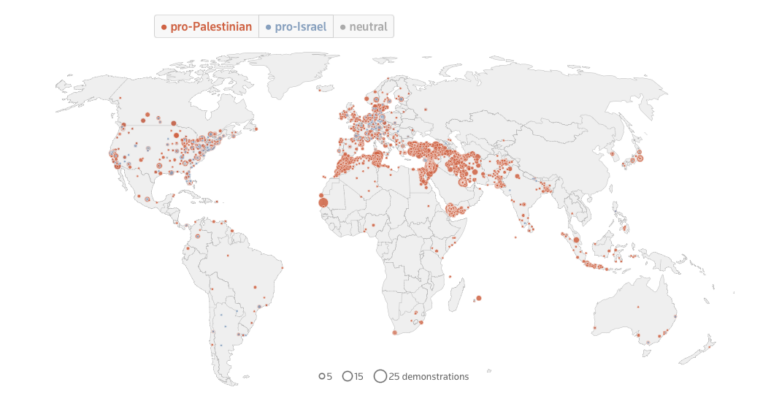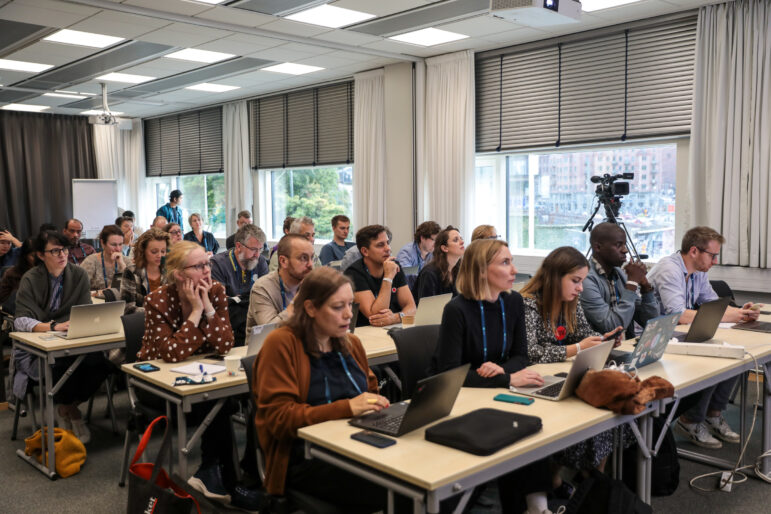

Reuters reporters mapped the protests sweeping the globe about the conflict in Israel and Gaza. Image: Screenshot, Reuters
Extrajudicial Killings in Bangladesh, Israel-Palestine Protests, China’s Maritime Footprint
This edition of our Data Journalism Top 10 column — covering stories published between November 6 and 19 — includes Netra News’s database on extrajudicial killings in Bangladesh during the past 13 years, a data-driven investigation into road accidents in Kyrgyzstan, and a note of remembrance for Philip Meyer, a pioneer and giant of data-driven journalism who passed away this month. Also: how power companies in Italy profited from COVID-19 lockdowns, and an unofficial census of rat populations in New York City subway stops (they don’t seem to enjoy living near Rockaway Beach).
Extrajudicial Killings in Bangladesh
According to Bangladeshi human rights researchers, the country’s security forces were involved in the deaths of 2,597 people between 2009 and 2022 — which Netra News notes is “almost certainly” an undercount. To go with a special report into extrajudicial killings, fatal shootings, and custodial torture, Netra News built a sophisticated database for these grim figures — searchable by name, location, and the security agency involved, such as police, army, or anti-terrorism battalions. The data and the reporting also discern geographic trends in killings and explain huge spikes of deaths in 2013-14 and 2018-19 related to elections and opposition protests. (While the government did not respond to this investigation, reporters noted the “Bangladesh authorities have long denied that its security forces carry out extrajudicial executions.”)
Israel-Gaza: Global Protests and Demonstrations
The events in Israel and Gaza have drawn global reactions. Using data from the Armed Conflict Location & Event Data Project (ACLED), Reuters charted protests, public demonstrations, and riots around the world over the past six weeks — by location, size, and whether they could be classified as pro-Palestinian, pro-Israel, or neutral. (Neutral demonstrations represent by far the smallest number of these protests.) The data showed that most demonstrations have been peaceful, with only about 5% turning violent, and that the United States was “home to the highest number of counter-demonstrations involving opposing pro-Israel and pro-Palestine protestors.” Also worth a look: a variety of maps and graphs, including those mapping the scale of the destruction in Gaza.
Breaking Down Spain’s Budget
Spanish nonprofit Civio looked deep into Spain’s budget execution data — that is, the amount of money that ends up being spent, rather than merely budgeted at approval stage — from 2016-2022. Often, there is a big gap between what is appropriated and what is ultimately spent; in some areas, like healthcare, especially during COVID-19, unexpected costs are to be expected; but discrepancies in other areas make less sense. Civio found some reliable trends, for instance, defense spending always far exceeds the budgeted cost, and some of the science always goes unspent. Reporters also probed some unexplained quirks: why is it that estimates for water costs for a building run by the department of defense are always wildly off the mark? Read more about the methodology here, or see Civio’s series looking into defense spending.
Auto Accident Deaths in Kyrgyzstan
There are almost 20 road accidents in Kyrgyzstan daily, notes independent outlet Kloop, based on data from the Ministry of Internal Affairs, which recorded 67,000 road accidents over the past decade. One third of those killed are pedestrians. Any improvements in these numbers tend to be fleeting, and preventative measures to promote better driving — such as having policemen teach traffic rules in mosques at Friday prayers — don’t seem to have a discernible benefit. Peshcom, a Kyrgyz initiative promoting pedestrian safety and public transport, studied data on road accidents in the capital, Bishkek; journalists from Kloop then looked in detail at 30 of the city’s most dangerous intersections for pedestrians and drivers. Among the findings: a simple lack of traffic lights, as well as the width of roads, are two of the key factors that make an intersection dangerous.
UK Childcare Costs
England’s “eye-watering” child care costs are among the highest among leading economies, according to the Organisation for Economic Co-operation and Development (OECD). Beyond the cost, there is also immense demand — with parents putting children on waiting lists for popular nurseries “soon after the moment of conception.” The UK government has promised to make childcare more affordable, so a team at the Guardian created an interactive calculator for parents to project their costs, and to identify how and when certain government policies could help.
Gaming the Electricity Market in Italy
Demand for electricity in Italy slumped in March 2020, when the country halted all non-essential industry at the onset of the COVID-19 pandemic. But instead of losing out as demand dropped, power companies instead found a way to rake in huge premiums. Bloomberg’s visual data team shows how, and by what mechanism this was possible — by selling electricity outside of Italy’s regular power market in what is known as the dispatch market. They analyze costs broken down by day, as well as millions of Italian power-trading and electricity records. At one point during the national lockdown between March and June 2020, prices for power firms selling outside of the regular market were 625% higher than the wholesale market price.
Tracking China’s Global Network of Ports
As part of a series of investigations into China’s global influence, The Washington Post examined the nation’s maritime trade expansion over the last decade. The country currently has ports and terminals in nearly 100 locations in over 50 countries. Journalists mapped these and analyzed their growth by comparing historic to more recent satellite imagery. The locations of these ports, which span all continents and are located among the world’s most strategic waterways, have given rise to concerns that China’s commercial shipping developments extend beyond economic interest, and could have “significant military implications.”
China’s South China Sea Footprint
The New York Times was also investigating China’s influence at sea this week, with this piece about the Spratly Islands, a hotly disputed archipelago in the South China Sea. Even though the area is more than 1,000 miles (approximately 1,600 km) from the Chinese mainland, and the subject of rival territorial claims by neighboring countries, Beijing maintains a strong presence there with a fleet of militarized fishing boats and coast guard vessels. The Times dug into shipping traffic data and analyzed satellite imagery in an attempt to understand China’s maritime campaign in the region.
Rats in New York
New York City has a rat problem — and it’s gotten worse since the coronavirus pandemic. Ivan Lokhov, a data visualization developer at Datawrapper, discovered a dataset of rat sightings in the New York subway system from a transit app. He crunched the numbers to see which subway stations are the most popular rat hangouts. Spoiler alert: Avoid the 191st station on the 1 line at all costs!
Land Use in Warsaw
Who does the land in the city of Warsaw, Poland, belong to and how is it being used? Polish daily Gazeta Wyborcza took a deep dive into the data to find out. It discovered that more than 50% of the capital’s land is public property, while 35% is owned by private individuals. Journalists also examined the ownership of buildings and spatial distribution of land use in the city.
Bonus: Mapping Global Disinformation Laws
Agência Lupa, a fact-checking and disinformation platform based in Brazil, combed through legislation from more than 190 countries to create an interactive map of laws that deal with the problem of disinformation. Sources included government websites and international bodies, and crowdsourced information from other fact-checking outlets. Users of the map can filter by category, country, and themes. More information here.
In Remembrance: Philip Meyer, Pioneer of Data-Driven Journalism
Philip Meyer, a pioneer of computer-assisted reporting, died aged 93 earlier this month. His critical contribution to the field is perfectly encapsulated by these obituaries in The New York Times and The Washington Post.
GIJN’s Data Journalism Top 10 list is curated fortnightly. Send your suggestions to us.
 Alexa van Sickle is an associate editor at GIJN. She was previously a senior editor for the foreign correspondence magazine Roads and Kingdoms. She has also been an editor at the International Institute for Strategic Studies and a publisher at an international law nonprofit in London. She is based in Vienna.
Alexa van Sickle is an associate editor at GIJN. She was previously a senior editor for the foreign correspondence magazine Roads and Kingdoms. She has also been an editor at the International Institute for Strategic Studies and a publisher at an international law nonprofit in London. She is based in Vienna.
 Eunice Au is GIJN’s global team manager based in Budapest, Hungary. Previously, she was a Malaysia correspondent for Singapore’s The Straits Times, and a journalist at Malaysia’s New Straits Times. She has also written for The Sun, Malaysian Today, and Madam Chair.
Eunice Au is GIJN’s global team manager based in Budapest, Hungary. Previously, she was a Malaysia correspondent for Singapore’s The Straits Times, and a journalist at Malaysia’s New Straits Times. She has also written for The Sun, Malaysian Today, and Madam Chair.









